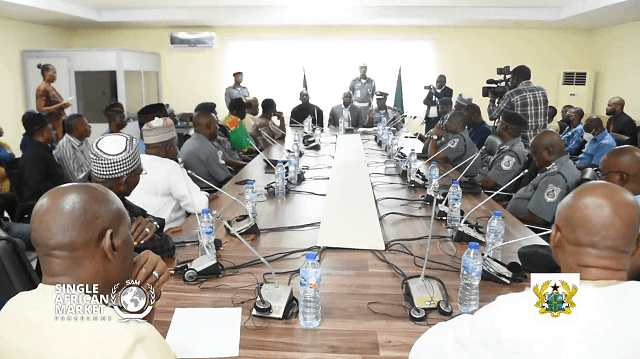The AfCFTA Secretariat in collaboration with the Government of the Federal Republic of Nigeria organized the Meeting of Customs and Trade Experts of the Republic of Benin; the Republic of Côte d’Ivoire; the Republic of Ghana of the Federal Republic of Nigeria and the Republic of Togo on June 1, 2022 at the Radisson Blu Hotel in Lagos, Nigeria.
The overall objective of the meeting was to present the findings of the field assessment of the Abidjan-Lagos Corridor and the implementation work programme as recommended by Ministers responsible for trade in the five member countries.
The meeting was attended by Customs and trade experts of Republic of Benin, Republic of Côte d’Ivoire, Republic of Ghana, Federal Republic of Nigeria and the Republic of Togo as well as reps from Afreximbank; Trade Mark East Africa (TMEA), the Union of African Shippers’ Councils (UCCA), the representatives of the Shippers’ Council from Côte d’Ivoire, Benin, Ghana, Nigeria and Togo, and the private sector.
In the presentation the TMEA team highlighted that the AfCFTA Secretariat together with its technical partner, Trade Mark East Africa (TMEA) and the Ministry of Trade of the Republic of Ghana went on a field mission along the Abidjan-Lagos Corridor from 17-22 January 2022 which was part of the field mission of the recommendations given at the 1st meeting of Directors General of Customs, held at Lomé in September 2021.
The recommendation was approved by the meeting of the Ministers responsible for Trade of Benin, Côte d’Ivoire, Ghana, Nigeria and Togo on issues of trade facilitation, customs cooperation and transit, along the Abidjan-Lagos Corridor which was also held in Lomé-Togo on 17th September, 2021.
The mission involved a drive through along the 1028km of road covering the Abidjan-Lagos Highway in order to establish the current operations and to identify any interventions which would be required in order to improve and facilitate trade along the corridor.
Highlights of findings included the need for a sustained program of engagement between Customs and its stakeholders to sensitize them on border operations; Challenges arising from language barrier at the borders between the Anglophone and Francophone countries and poor ICT interconnectivity and unstable electricity at the borders thus affecting automation of procedures.
Other findings suggested the need for the harmonization of procedures and documentation at border posts, upgrade of infrastructure modernization of Border procedures at the borders together with the need to consider establishment of one stop border posts among many others.
Ghana’s Deputy Minister of Trade and Industry, Herbert Krapa, who chaired the deliberations, expressed gratitude to the team in ensuring efficient trading on the Adjan-Lagos corridor.
“This project is not complete without all stakeholders, especially Customs officials for the role that you’re playing,” he emphasized.
Source;thebftonline.com

